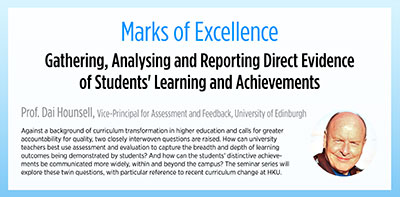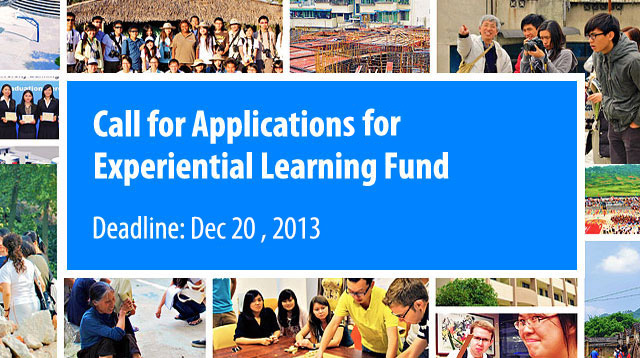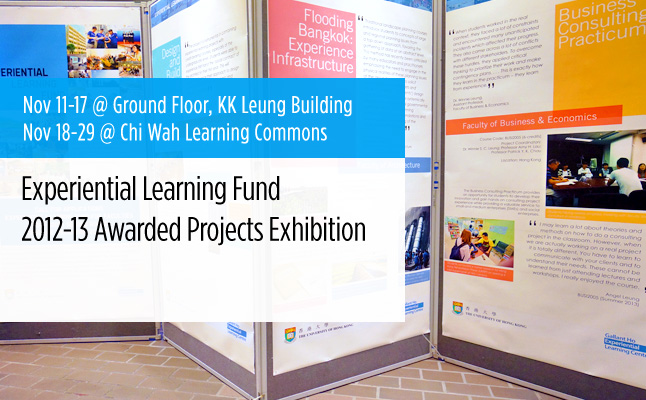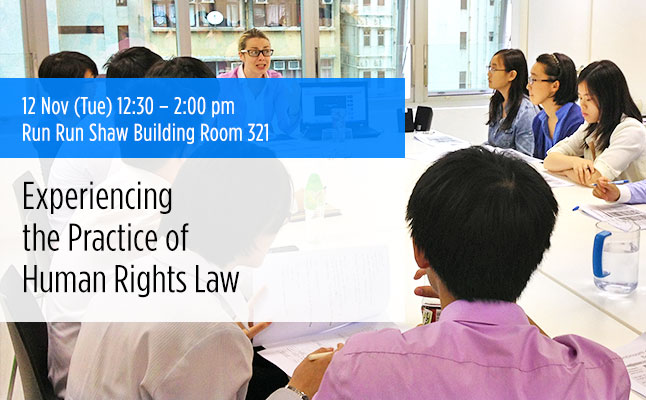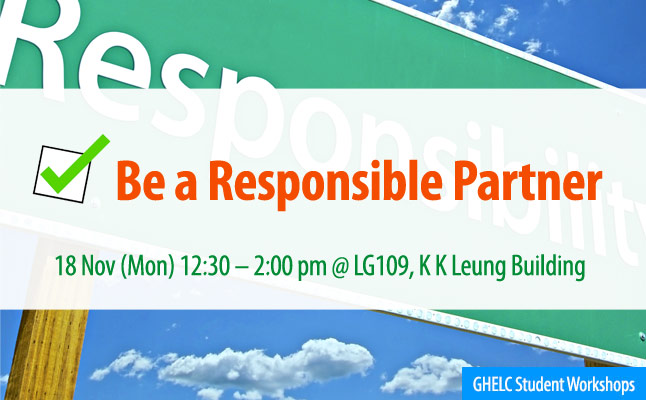Issue 4 (20 Nov 2013)

Identifying experiential learning opportunities in the community (Part I):
Food assistance, district poverty alleviation, old building repairs and social enterprise
Elsa Lam, GHELC
Experiential learning takes students out of the classroom and involves them in real life issues of the community. In order to create and actualise opportunities for experiential learning, our Centre, since its inception in March 2012, has established a wide network of local and overseas community partners for Faculties to access. As a result, an array of experiential learning opportunities is available through our Centre.
Presented is an overview of potential opportunities for faculty reference. These represent initial ideas and framework proposals identified by community partners and listed for consideration and discussion to the needs and vision of respective faculty members. It is our aims to support faculties to create a program that makes experiential learning an integral and meaningful part of the academic coursework.
Poverty in Hong Kong
Hong Kong has one of the developed world’s widest wealth gaps. More than 1.3 million Hong Kong people live in households that fall below the newly formalized poverty line. In response to the poverty issue, our Centre is in partnership with our community partners in supporting their works on individual level for food assistance and district level for poverty alleviation program formulation as well as old building repairs.
 Food assistance
Food assistance
The various forms of food assistance program (emergency food assistance, hot meal services, food bank and collective food purchase) in Hong Kong provide diverse experiential learning opportunities for Business, Medical Science, Science and Social Sciences disciplines. Project opportunities may include food safety, nutrition (special diets for beneficiaries with special dietary needs), business plan development, impact assessment on food assistance, documenting evolution and changes of the food aid program in Hong Kong history, and more. The platform of provision of food assistance has also given rise to various innovative programs for serving underprivileged children and families and other individuals from vulnerable or marginalized social backgrounds such as single-parent family, ethnic minorities, new immigrants and elders.
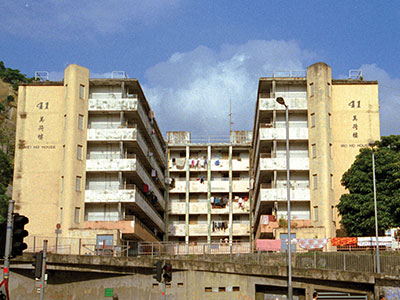 District poverty alleviation network
District poverty alleviation network
New community network focused on the vulnerable groups is being established between the Church and NGOs in Shek Kip Mei area. Given that the network is still in its formative stage, contribution and shaping of the poverty alleviation agenda at both policy and project implementation level are available. Multi-disciplinary opportunities through participation in the project exist in mapping of current social service network, identification and location of the vulnerable groups and in co-creation of innovative programs meeting their needs.
Old building repair and maintenance
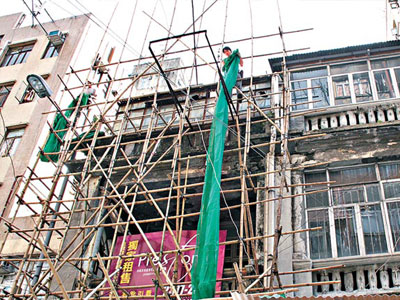 The current legislation requires owners of buildings aged 30 or above, to carry out general technical inspections including common parts, external walls, projections and signboards, once every 10 years. However, some homeowners may be in need of financial assistance and external help to meet the legislative requirements. The community partner is willing to explore and discuss with faculties the possibilities for provision of appropriate technical and social support in relation to building inspection for owners in need of assistance.
The current legislation requires owners of buildings aged 30 or above, to carry out general technical inspections including common parts, external walls, projections and signboards, once every 10 years. However, some homeowners may be in need of financial assistance and external help to meet the legislative requirements. The community partner is willing to explore and discuss with faculties the possibilities for provision of appropriate technical and social support in relation to building inspection for owners in need of assistance.
Social Enterprises in China & Laos
The world has been witnessing a surge of interest and establishment of social enterprises focused especially on social and economic integration and promotion of the vulnerable groups. The following are the specific opportunities on social enterprises in China and Laos.
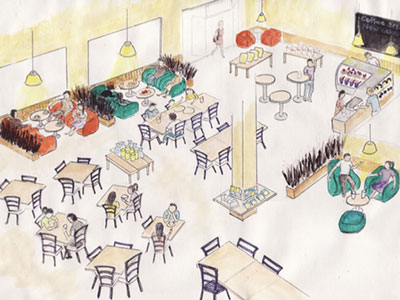 Social enterprises in Guangxi and Shaanxi, China
Social enterprises in Guangxi and Shaanxi, China
An orphanage in the rural area of Guangxi is planning the creation and establishment of social enterprises that would provide business and employment opportunities for the orphans who want to stay in the orphanage also after completing their schooling, as well as disadvantaged youth in the neighborhood. Both the venue and the initial business concept have been prepared. A multi-disciplinary project to provide business, legal and social inputs for the start-up of a social enterprise will be a good learning platform for our students to understand the various management challenges of social enterprises in remote areas of China.
Similar opportunities for setting up of social businesses for young people with disability are found in Shaanxi. In relation to these plans, there are needs for design and/or assessment of a variety of social business plans.

Coffee farm in Laos
This coffee farm is a private enterprise aimed at alleviation of poverty of the Lao people through capacity building and skills development leading to independent coffee farming. More specifically, local farmers start as contractors of the functioning coffee farm and receive three years of training. According to statistics, in the three-year time the farmers develop sufficient expertise to become independent and economically self-reliant coffee growers, which means overcoming poverty. Learning opportunities exist in the area of preparation and implementation of the coffee farm plans, the Lao coffee farmers’ training and learning process, impact assessment, community development as well as construction and building activities serving the needs of Lao coffee farmers in training.
In the next issue, we will continue with exploring different community partners in areas of education, vulnerable children, health and nutrition. Faculties can explore the opportunities in integrating them into the curriculum.
News Update
GHELC Seminar: Evidence of Experiential Learning by Prof. Dai Hounsell on December 6, 2013This is the second seminar of “Marks of Excellence Seminars – Gathering, Analysing and Reporting Direct Evidence of Students’ Learning and Achievements. Professor Dai Hounsell from the University of Edinburgh will focus more closely on the enhanced opportunities for experiential learning which is one of the hallmarks of the quality of undergraduate education at HKU. It considers how excellence in experiential learning can be captured and communicated, focusing particularly on strategies that are complementary to traditional forms of assessment and feedback, including those that capitalise on advances in communication technologies. |
Experiential Learning Fund 2013-2014 (Second Round) – Call for ApplicationsThe Experiential Learning Fund supports Faculties in introducing, expanding or enhancing experiential learning in their undergraduate curriculum. The deadline for the second round of application is December 20, 2013. This round of application is for experiential learning projects to take place in January term and summer. |
|
Experiential Learning Fund 2012-13 Awarded Projects ExhibitionAn exhibition of The Gallant Ho Experiential Learning Fund 2012-2013 awarded projects will be held on November 11-29, 2013 at HKU Campus. Student learning and experiential learning activities will be highlighted. The Gallant Ho Experiential Learning Fund 2012-2013 Awarded Projects Exhibition |
Past Events
GHELC Seminar Series
Experiencing the Practice of Human Rights Law on November 12, 2013The Clinical Legal Education Programme – Refugee Stream was launched in January 2010 in the Faculty of Law to provide students with opportunities to learn both the theory and practice of domestic and international refugee law under the direct supervision of the HKRAC Staff Attorney – Clinical Programmes. Professor Simon Young and research staff from the Faculty of Law, HKU and a HKRAC Staff Attorney discussed the significance and intricacies of academic-community partnerships in creating experiential learning opportunities for law students. |
GHELC Student Workshops
Be a Responsible Partner on November 18, 2013To empower students with the necessary mindset, knowledge and skills in initiating and organizing experiential learning activities, Dr. Albert Ko, Director of GHELC shared his experience and discussed different issues students could encounter during experiential learning activities such as, common blind spots, respecting local culture, living style, environment and economy, personal safety and team security. |

